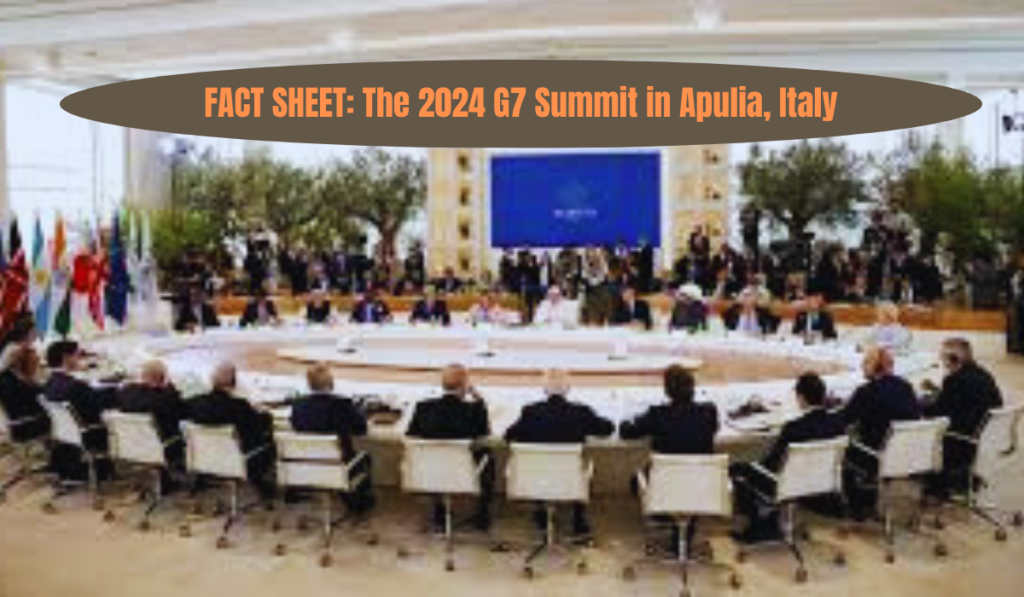Introduction
In Apulia, Italy, President Biden and other G7 leaders gathered to address major global challenges. They discussed supporting Ukraine, tackling climate change, ensuring economic fairness, and helping developing countries invest in their futures. Here’s what happened at the summit:
Supporting Ukraine’s Fight for Freedom
Reaffirming Support
- G7 leaders, alongside Ukrainian President Zelenskyy, pledged unwavering support for Ukraine against Russian aggression.
- They sent a clear message to Russia that they would stand by Ukraine for as long as necessary.
Financial Aid
- A plan was announced to unlock $50 billion for Ukraine by using the interest from Russian assets frozen in the European Union and other places.
- This money will help Ukraine’s military, budget, and rebuilding efforts.
- The details of this financing will be finalized by the end of the year.
Increasing Pressure on Russia
- The Biden Administration introduced new sanctions and export controls against Russia and those supporting its war economy.
- Sanctions target over 300 individuals and entities in Russia, China, and elsewhere, focusing on Russia’s financial systems, evasion networks, and future energy revenues.
- President Biden and President Zelensky signed a U.S.-Ukraine Bilateral Security Agreement, deepening their security cooperation and ensuring support in the event of future attacks.
Long-Term Support
Advancing International Peace, Security, and Prosperity
Gaza Crisis
- The G7 supported a comprehensive deal for Gaza, calling for a ceasefire, release of hostages, and increased humanitarian aid.
- The deal aims to end the crisis while ensuring Israel’s security and safety for Palestinians in Gaza.
Indo-Pacific Stability
- President Biden emphasized U.S. engagement in the Indo-Pacific, highlighting the need for peace across the Taiwan Strait and addressing concerns about China’s actions in the South China Sea.
Cooperation with Africa
- The G7 pledged to work with African countries to enhance global stability and prosperity, endorsing their call for a greater voice in international decisions.
Promoting Economic Resilience and Security
Countering Unfair Practices
- The G7 committed to confronting China’s unfair economic practices, such as overcapacity in industries like solar, wind, and electric vehicles, which harm global markets and create supply chain dependencies.
Protecting Technologies
- The G7 will update tools to protect critical technologies from misuse and promote secure international trade and investment.
- They are also enhancing cooperation on research security, data security, and export controls.
Partnering with Developing Countries
Addressing Global Debt
- President Biden and Kenyan President Ruto led the Nairobi-Washington Vision, encouraging international support to help developing countries manage debt and invest in critical areas.
- The G7 will work with the IMF and World Bank to implement this vision.
Boosting Financial Power
- The G7 announced plans to increase World Bank lending by $70 billion over the next decade and unlock $250 billion in new lending capacity at other multilateral development banks.
Infrastructure Investments
- At a side event co-hosted by President Biden and Italian Prime Minister Meloni, private sector leaders announced significant investments in digital infrastructure and economic corridors in emerging markets.
Accelerating the Clean Energy Transition
Climate Commitments
- The G7 reaffirmed their COP28 commitments to triple renewable energy capacity and double global energy efficiency by 2030.
- They committed to phasing out unabated coal power generation and deploying 1,500 GW of long-duration energy storage by 2030.
Supporting Clean Energy
- The G7 pledged to contribute to the Partnership for Resilient and Inclusive Supply-Chain Enhancement (RISE) to help low- and middle-income countries invest in their economies and strengthen supply chains for clean energy.
Nuclear and Fusion Energy
- The G7 recognized nuclear energy as essential for reducing fossil fuel dependence and improving energy security.
- They established a Working Group on Fusion Energy to promote cooperation in this emerging field.
Promoting Health and Food Security
Food Security Initiative
- The Apulia Food Security Initiative was launched to address barriers to food security and build resilient agricultural systems.
- The G7 is committed to sustainable and resilient food systems aligned with the U.S.’s Feed the Future Initiative.
Global Health Security
- The G7 called for new pledges to the Pandemic Fund and catalytic financing to boost pandemic prevention, preparedness, and response.
- They also supported expanding immunization coverage through a replenishment of Gavi, the Vaccine Alliance.
Combatting Antimicrobial Resistance (AMR)
- G7 leaders committed to addressing AMR by ensuring a successful High-Level Meeting on AMR in September 2024 to drive action on this critical issue.
Investing in Childcare for Women’s Economic Participation
Supporting Women in the Workforce
- The G7 aims to support 200 million more women to join the workforce by 2035 by investing in childcare.
- This includes contributions to the World Bank’s Invest in Childcare Initiative to promote women’s economic opportunities.
Enhancing Partnership on Migration
Managing Migration
- The G7 affirmed its commitment to managing migration through safe and regular pathways, addressing root causes of irregular migration, and improving border management.
Deepening Cooperation on Artificial Intelligence
Promoting Safe AI
- In line with President Biden’s vision, the G7 is building partnerships to ensure AI benefits are widely shared while mitigating risks.
- G7 labor ministers will develop an action plan to leverage AI’s potential to increase job quality and address challenges to workers and labor markets.
Strengthening AI Safety
- The G7 committed to enhancing cooperation on AI governance and risk management, including interoperability between national approaches and strengthening the role of AI Safety Institutes.
Supporting Resilient Technology Supply Chains
- The G7 established a Semiconductors G7 Point of Contact Group to enhance coordination on issues affecting the semiconductor sector.
Table of Contents
References
- G7 Summit Official Statements
- U.S. Government Releases on Economic and Security Policies
- International Development and Climate Change Reports

